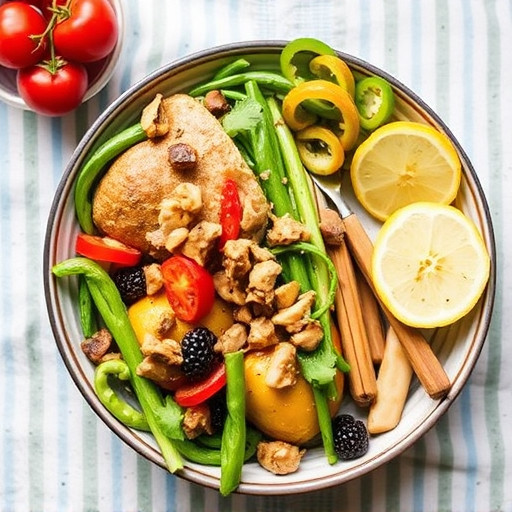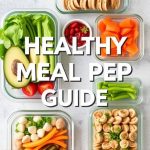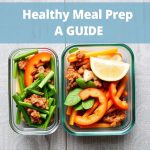Meal prep is a powerful strategy for weight management by gaining control over eating habits, saving time, reducing stress, and ensuring balanced diets tailored to individual needs. It involves weekly meal planning, preparation, and storage, fostering a healthier relationship with food. Key aspects include assessing current habits, creating a balanced plan, involving others, choosing nutritious foods like whole grains, lean proteins, fruits, and vegetables for higher nutrient density and lower calorie content. Portion control is vital, using guidelines and smaller plates to meet calorie goals. Staying motivated through achievable goals, support, and consistent planning is crucial for success.
In today’s fast-paced world, effective meal preparation is a powerful tool for achieving weight loss and maintenance goals. “Meal Prep Tips for Weight Loss and Maintenance” guides you through the process of transforming your culinary routine into a strategic approach to health. From understanding the benefits of advanced planning to mastering portion control, this article offers practical strategies, healthy food choices, and motivation techniques to keep you on track. By incorporating these tips into your weekly regimen, you’ll be well-equipped to make nutritious choices effortlessly.
- Understanding the Power of Meal Prep
- Planning for Success: Strategies and Tips
- Healthy Food Choices for Weight Management
- Portion Control Techniques to Master
- Staying Motivated and Avoiding Common Pitfalls
Understanding the Power of Meal Prep

Meal prep is more than just a trend; it’s a powerful tool for achieving and maintaining a healthy weight. By taking time to plan and prepare your meals in advance, you gain control over what you eat and make healthier choices easier. This simple yet effective strategy allows you to bypass the temptation of fast food or convenience options, often high in calories, sugar, and unhealthy fats. With pre-prepared meals, you can stick to a balanced diet tailored to your nutritional needs.
Additionally, meal prep saves time and reduces stress during busy days. When your meals are already organized, you’re less likely to make impulsive food decisions or overeat due to convenience. It encourages portion control and ensures you eat according to your caloric and macronutrient goals. Start by planning a week’s worth of meals, ensuring variety and nutritional balance, then prepare and store them in advance. This simple habit can be a game-changer for anyone looking to improve their relationship with food and reach their weight loss or maintenance objectives.
Planning for Success: Strategies and Tips

Meal planning is a powerful tool for achieving your weight loss or maintenance goals. It’s about taking control and setting yourself up for success. Start by assessing your current eating habits, preferences, and restrictions. Create a weekly meal plan that aligns with your fitness routine and nutritional needs. This process involves deciding on balanced meals and snacks, considering portion sizes, and incorporating a variety of foods to ensure you get all the essential nutrients.
Consider using a planner or digital tool to organize your meals, making it easier to stick to your plan. Pre-prepare and portion out meals in advance to avoid last-minute, unhealthy choices. This strategy saves time during busy days and helps maintain consistency. Additionally, involve family or roommates in meal prep sessions to make it a collaborative effort, fostering accountability and healthy eating habits for everyone involved.
Healthy Food Choices for Weight Management

Making healthy food choices is pivotal to managing your weight effectively. Opt for a balanced diet rich in whole grains, lean proteins, and plenty of fruits and vegetables. These foods are packed with essential nutrients while being relatively low in calories, helping you stay full and satisfied without overeating. Incorporate more plants into your meals by swapping refined carbohydrates like white rice or pasta with quinoa, brown rice, or whole wheat alternatives.
When selecting proteins, go for fish, poultry, legumes, and tofu over red meats. These options are typically lower in saturated fat, a known contributor to weight gain. Additionally, focus on healthy fats found in avocados, nuts, seeds, and olive oil, which can support satiety and overall health. Remember, portion control is key; even healthy foods should be consumed in moderation to maintain a calorie balance that supports your weight loss or maintenance goals.
Portion Control Techniques to Master

Mastering portion control is one of the most effective strategies for achieving and maintaining a healthy weight. It’s about understanding how much food your body needs at each meal, rather than relying on instinct or plate size. Start by recognizing serving sizes from common foods—a palm-sized piece of protein, a cup of vegetables, and a tablespoon of healthy fats are simple guidelines to keep in mind.
Use smaller plates and bowls to help with visual portion control. Weighing your food for a few days can also give you valuable insights into typical servings. This practice allows you to adjust your intake accordingly, ensuring meals feel satisfying while aligning with your calorie goals. Remember, it’s about balance—enjoying all foods in moderation rather than restricting yourself from certain categories.
Staying Motivated and Avoiding Common Pitfalls

Staying motivated is key when it comes to meal prep for weight loss. Set realistic goals and celebrate small wins along the way. Keep reminders of your ‘why’—whether it’s to boost energy levels or achieve a specific goal—to stay focused. It can be helpful to plan meals with friends or family, turning it into a collaborative effort that provides support and accountability.
Avoiding common pitfalls is also essential. Don’t get discouraged if results don’t happen overnight. Meal prep is a journey; consistency is key. Avoid the temptation to skip meals or make unhealthy substitutions. Remember, planning balanced meals with a variety of nutritious foods will set you up for success. Stay organized by prepping in batches and storing portions, ensuring you always have healthy options readily available to prevent reaching for less wholesome alternatives.
Meal prep is a powerful tool for achieving and maintaining a healthy weight. By adopting these tips, you can streamline your journey towards a balanced diet, save time, and make healthier choices effortlessly. Remember, consistency is key; with proper planning and a positive mindset, you’re well on your way to reaching your fitness goals.


